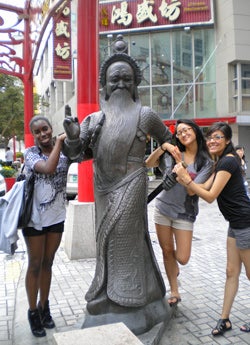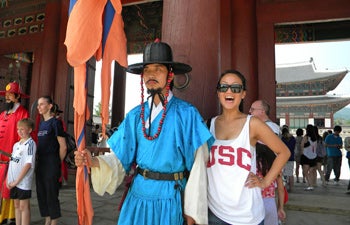Undergrads Find their Seoul Mate
Growing up in Tampa, Fl., where Koreans comprise less than 1 percent of the population, Jimisha Tolliver had never heard of lotus chips.
When visiting Korea for the first time, the USC College senior couldn’t get enough of the crispy, slightly sweet snack made from the root of a lotus plant, famous for their rosy-pink or white blooms.
“We were visiting a monastery and they were serving lotus chips,” recounted Tolliver, a Spanish major. “I thought to myself, ‘I’ll wait until I get back to the dorm to eat.’ Then I tried one and really loved them. I never thought I’d like something so different so much.”
The tiny discovery was just one of countless experiences Tolliver and other undergraduates enjoyed during the Global East Asia study-abroad program in Korea last summer. In their month-long excursion, they took a course, “Imagining Seoul: A Global Metropolis through Film and Literature,” taught by Sunyoung Park, assistant professor of East Asian languages and cultures.

Jimisha Tolliver (left), Michelle Lee and Verenice Torres huddle around a statue in front of a Chinese restaurant in South Korea. Photo courtesy of Jimisha Tolliver.
The seven USC students were joined at Ewha Womans University in Seoul by three local Koreans taking the class. The local students acted as the group’s tour guides, taught them about Korean culture and helped them with the language, among other things.
“We ate meals with them and shopped with them. They showed us the best places in the city,” College senior Michelle Lee said of their Korean classmates. “And they really helped us when it came to bargaining for the knockoff designer bags.”
Grace Ryu, associate director of the East Asian Studies Center (EASC) based in the College, said the combination of a boots-on-the-ground experience and classroom instruction is the program’s beauty.
“Through a generous grant from the Freeman Foundation, we’re able to offer this unique experiential learning opportunity in China, Japan and Korea every summer with all travel expenses covered by EASC,” Ryu said. “Students not only have the opportunity to spend four weeks studying and traveling abroad with USC faculty while interacting with local students, but can do so without having to worry about the cost of travel, lodging and meals.”
The Freeman Foundation is a Vermont-based philanthropic group dedicated to expanding undergraduate interest in East Asia. The program receives additional support from the College, the Korean Studies Institute based in the College and the USC U.S.-China Institute.
The program is open to USC undergraduates from any school or major. They should take at least two courses related to the country of study prior to their trip. The EASC covers the cost of all major travel-related expenses including roundtrip international airfare, lodging and meals, local transportation, course entrance fees, and travel within the country. Students who complete all course requirements receive four units of upper-division USC credit.
For Summer 2011, the course in China will be taught by Brett Sheehan, associate professor of history, at Fudan University in Shanghai May 20 to June 19. Students will also travel to Beijing and Yan’an. The Japan course will be taught by Saori Katada, associate professor of international relations, at Meiji University in Tokyo May 27 to June 26. Students will travel to Yokohama, Kyoto and Hiroshima. In Korea, Kyung Moon Hwang, associate professor of history, will instruct students at Ewha Womans University in Seoul. Students will travel to Pusan, Kyongju, Kwangju, and take short trips to Inchon, Suwon and the Korean Demilitarized Zone.
The application deadline for the Summer 2011 program is Feb. 11.
Returning to Seoul, Tolliver and Lee had different reasons for choosing to study in Korea. Lee’s parents are from South Korea and she wanted to learn more about the country she had visited twice as a child.
“Visiting for the first time as an adult, I was able to put all the stories my grandmother told me about Korea into context,” said Lee, who is majoring in political science and sociology, with a minor in human rights. She also met with three aunts and uncles, Seoul residents who treated her to a traditional Korean dinner.

Michelle Lee of USC College stands next to a character dressed as a royal guard at Kyongbok Palace in Seoul, Korea. Photo courtesy of Michelle Lee.
“My grandma and mom are great cooks and I’m used to good Korean food,” said Lee of Los Angeles. “Certain Korean dishes — the noodle dish kal gook su, for example — served in restaurants here don’t compare to the ones served in Korea.”
Lee, who already spoke some Korean said her Korean improved on the trip. Tolliver, who speaks Spanish, said the trip made her want to study the Korean language. Tolliver, who has a minor in music industry, chose Korea after becoming an avid fan of Korean music.
“I fell in love with it,” Tolliver said of Korean pop and traditional folk music. “Then I became obsessed with wanting to know everything about it.”
A songwriter, Tolliver said she stumbled upon Korean music on a Web site. So in Korea, she already knew many of the songs playing in stores and malls. Music streaming from speakers in malls often played Korean ballads, she recalled.
“I always wondered, ‘Is the mall really the place to play these sad ballads?’ ” Tolliver said. “Then there is pansori, traditional Korean music. You hear drums, wailing and a lot of screaming, but it sounds nice. I really started to like the music and it inspired me to write songs that were deeper and more heartfelt.”
Although Lee’s family is from Korea, she said she was quickly pegged as an American by the way she dressed: much more casually than Korean women who are usually in dresses and high heels.
“We definitely stood out,” she said. “We learned a lot about Korea in the course, and the things we saw and the people we met made for a very insightful experience.”
Visit the East Asian Studies Center for an application and more information.
Read about Freeman Foundation founder Houghton “Buck” Freeman, who died Dec. 1 at age 89.